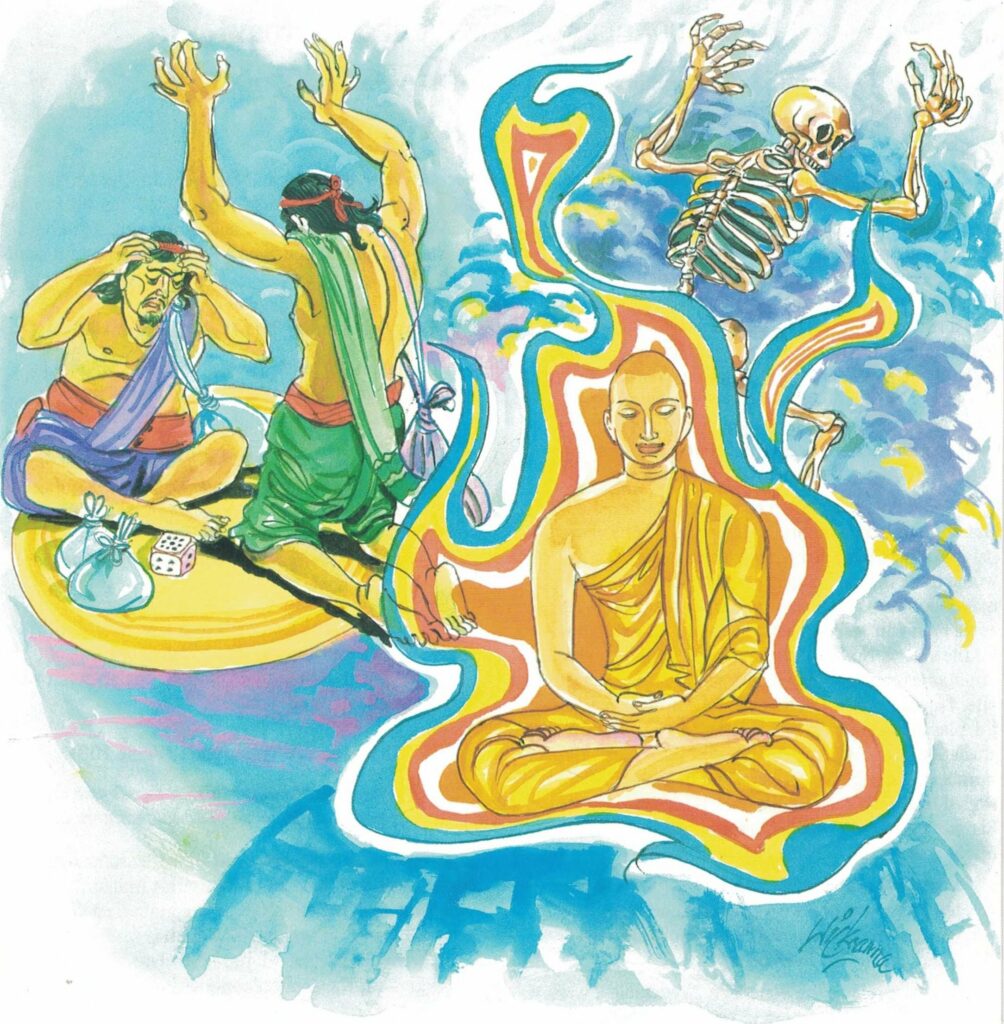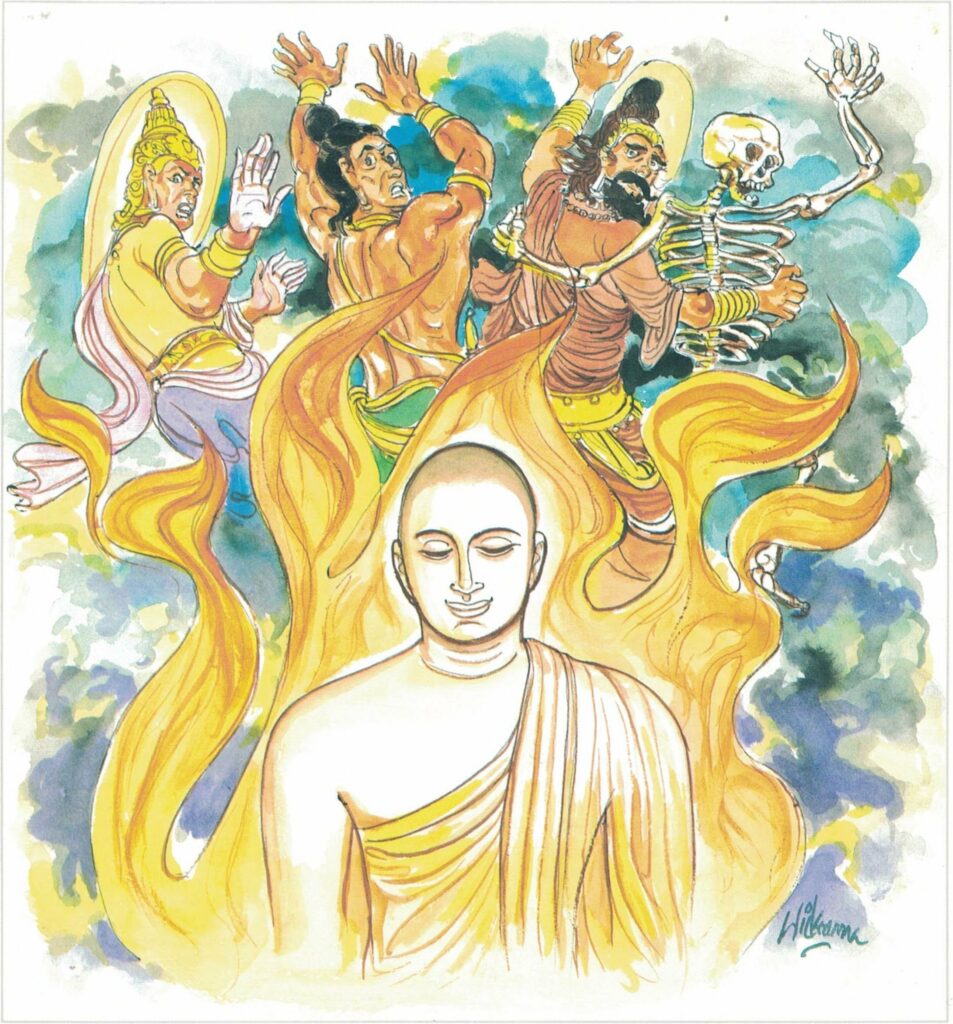Pali text, illustration and English translation of Dhammapada verse 104-105:
attā have jitaṃ seyyo yā cāyaṃ itarā pajā |
attadantassa posassa niccaṃ saññatacārino || 104 ||
n’eva devo na gandhabbo na māro saha brahmunā |
jitaṃ apajitaṃ kayirā tathārūpassa jantuno || 105 ||
104. Greater the conquest of oneself than subjugating others, that one who’s always well-restrained, that one who’s tamed of self—
105. …Neither deva nor minstrel divine, nor Māra together with Brahma, can overthrow the victory of such a one as this.


The Story of the Brāhmin Anatthapucchaka
While residing at the Jetavana Monastery, the Buddha spoke these verses, with reference to the brāhmin Anatthapucchaka.
On one occasion, a brāhmin by the name of Anatthapucchaka, came to the Buddha and said to him, “Venerable, I think that you know only the practices that are beneficial and not the practices that are not beneficial.” To him, the Buddha answered that he also knew the practices which were not beneficial and harmful.
Then the Buddha enumerated six practices which cause dissipation of wealth; they are:
- sleeping until the sun has risen,
- habitual idleness,
- cruelty,
- indulgence in intoxicants which cause drunkenness and negligence,
- sauntering alone in streets at unearthly hours, and
- sexual misconduct.
When the brāhmin heard this, he applauded the Buddha, saying, ‘Well said, well said, teacher of the multitude, leader of the multitude! You know indeed both gain and loss.” “Indeed, brāhmin, there is none other that knows loss so well as I”. Then the Buddha considered within himself what motive actuated the brāhmin, and asked him, “Brāhmin, how do you make your living?” “By gambling, Venerable.” “But who wins, you or the other man?” “Sometimes I win and sometimes the other man wins.” Then said the Buddha, “Brāhmin, a trifling matter is the victory of him who defeats another; there is no superior advantage in such a victory. But he who overcomes his depravities and so conquers self, wins a better victory, for such a victory no one can turn into defeat.”
Explanatory Translation (Verse 104)
attā jitaṃ have seyyo, yā ca ayaṃ itarā pajā
attadantassa niccaṃ saññatacārino posassa.
attā: one’s own self; jitaṃ [jita]: conquered; have seyyo [seyya]: is truly noble; yā ca ayaṃ itarā pajā: if other people are conquered (that is not noble); ca attadantassa: the self-conquerer; niccaṃ [nicca]: constantly; saññatacārino [saññatacārina]: is restrained in behaviour; posassa: of that kind of individual.
Self conquest is greater than the conquest of others. The victory of one who conquers himself cannot be turned into defeat. He remains a self-controlled individual who lives ever disciplined.
Explanatory Translation (Verse 105)
tathārūpassa jantuno jitaṃ devo,
na eva apajitaṃ kayirā gandhabbo
na Brahmunā saha Māro na
tathārūpassa jantuno [jantuna]: of that kind of person; jitaṃ [jita]: conquest; devo: an angel or a god; na eva apajitaṃ kayirā: cannot be turned into a defeat; gandhabbo [gandhabba]: a spirit; Brahmunā: creator; saha: and; Māra: Devil; na: cannot turn into a defeat.
Such conquest cannot be turned into defeat either by a god, a spirit, a Māra (devil) or a Brahmā (creator).
Commentary and exegetical material (Verse 104-105)
gandhabbo: a group of divine beings given to singing, dancing and rejoicing. In this stanza it is said that not even a ‘gandhabbo’ can turn a self-conquerer’s victory into defeat. According to traditional commentaries, the ‘gandhabbas’ live in the heaven called ‘Cātur mahā rājika’–the four great kingdoms of heaven. They take delight in music and dancing.
In a traditional stanza their groups are enumerated thus:
Hā, hū hūs citgraratho,
Hanso, vishvāvasus tathā
Gomāyustumburu nandi,
Reva mādrusca te smrutā.“They are known by such names as Hā-hā, hū, citraratha, hansa, vishvāvasu, gomāya, tumburu and Nandi.”
In the ancient text ‘Vahni Purāna’, (The Adoration of Fire) they are divided into eleven groups.
All these gandhabbas are divided into two main groups:
- mātarva gāndharva (those who are born in that state due to past merit in this age);
- deva gāndharva (those born in that state due to merit in previous ages).
attadantassa posassa: to the person who has conquered his own self. In Buddhist thought atta (soul or self) is mentioned at times for the conventional purpose of identifying a person. But, the concept of no soul or selflessness (anatta) is a central principle of Buddhist thought. The following is a detailed commentary on this concept: apart from mind and matter, which constitute this so-called being, Buddhism does not assert the existence of an immortal soul, or an eternal ego, which man has obtained in a mysterious way from an equally mysterious source. A soul which is eternal must necessarily remain always the same without any change whatever. If the soul which is supposed to be the essence of man is eternal, there could be neither a rise nor a fall. Nor could one explain why ‘different souls are so variously constituted at the outset.’ To justify the existence of endless felicity in an eternal heaven and unending torment in an eternal hell, it is absolutely necessary to postulate an immortal soul.
“It should be said,” writes a philosopher, “that the old distinction between soul and body has evaporated, quite as much because ‘matter’ has lost its solidity as because mind has lost its spirituality. Psychology is just beginning to be scientific. In the present state of psychology belief in immortality can at any rate claim no support from science.”
According to the learned author of the Riddle of the Universe:
“This theological proof that a personal creator has breathed an immortal soul (generally regarded as a portion of the divine soul) into man is a pure myth. The cosmological proof that the ‘moral order of the world’ demands the eternal duration of the human soul is a baseless dogma. The teleological proof that the ‘higher destiny’ of man involves the perfecting of his defective, earthly soul beyond the grave–rests on a false anthropism. The moral proof–that the defects and the unsatisfied desires of earthly existence must be fulfilled by ‘compensative justice’ on the other side of eternity–is nothing more than a pious wish. The ethnological proof–that the belief in immortality, like the belief in God, is an innate truth, common to all humanity–is an error in fact. The ontological proof–that the soul, being a simple, immaterial, and indivisible entity cannot be involved in the corruption of death–is based on an entirely erroneous view of the psychic phenomena; it is a spiritualistic fallacy. All these and similar ‘proofs of athanatism’ are in a parlous condition; they are definitely annulled by the scientific criticism of the last few decades.” If nothing in the form of a spirit or soul passes from this life to the other, what is it that is reborn? In this question it is taken for granted that there is some thing to be re-born. A few centuries ago it was argued–“Cogito, ergo sum” (I think, therefore I am). True, but first it has to be proved that there is an “I” to think. We say that the sun rises in the East and sets in the West, although we know that actually it is not so. We have to admit that one cannot strike an identical place twice although to all appearance one has done so. Everything changes so soon. For no two moments are we identically the same.
Buddhists agree with a philosopher when he says, “There is obviously some reason in which I am the same person as I was yesterday, and, to take an even more obvious example, if I simultaneously see a man and hear him speaking, there is some sense in which I see and hear.”
Brahma: These stanzas state that the self-conquest achieved by a person cannot be undone either by a gandhabba or Brahmas. Brahmas are Brahma-kāyika-devas.
Brahma-kāyika-deva: The ‘Heavenly Beings of the Brahma-worlds, inhabit the 3 first heavens of the Fine-material world (rūpa-loka), corresponding to the 1st Absorption (jhāna) The highest ruler of them is called the Great Brahma (mahā-brahmā). With caustic humour he is said to pretend: ‘I am Brahmā, the Great Brahma, the Most High, the Invincible One, the Omniscient One, the Ruler, the Lord, the Creator, the Maker, the Perfect One, the Preserver, the Controller, the Father of all that was and will be.’
Brahma-loka: ‘Brahma-world’, in the widest sense, is a name for the Fine-material (rūpa-loka) and Immaterial World (arūpa-loka); in a narrower sense, however, only for the first three heavens of the Finematerial world.
The Brahma belongs to devas.
Deva: (lit. the Radiant Ones; related to Lat. deus), Heavenly Beings, deities, celestials; are beings who live in happy worlds, and who, as a rule, are invisible to the human eye. They are subject however, just as all human and other beings, to ever-repeated rebirth, old age and death, and thus not freed from the cycle of existence, and not freed from misery.
There are many classes of heavenly beings.
I. The 5 classes of heavenly beings of the Sensuous Sphere (kāmāvacara or kāma-loka;are: Cāturmahārājikadevā, Tāvatiṃsa, Yāma, Tusita, Nimmāna-rati, Paranimmita-vasavatti.
II. The heavenly beings of the Fine-material Sphere (rūpāvacara or rūpaloka) are:
(1) Brahma-pārisajja, Brahma-purohita, Mahā-brahma. Amongst these three classes will be reborn those with a weak, medium or full experience of the 1st absorption (jhāna).
(2) Parittāba, Appamānābha, Āhassara. Here will be reborn those with experience of the 2nd absorption.
(3) Paritta-subha, Appamāna-subha, Subha Kiṇṇa (or Kiṇha). Here will be reborn those with experience of the 3rd absorption.
(4) Vehapphala, Asañña-satta, Suddhāvāsa. Amongst the two first classes will be reborn those with experience of the 4th absorption, but amongst the third class only anāgāmis.
III. The 4 grades of heavenly beings of the Immaterial Sphere (arūpāvacara or arūpa-loka) are: the Heavenly Beings of the Sphere of Unbounded Space (ākāsānañcāyatanūpaga-devā), of Unbounded Consciousness (viññāṇañcāyatanūpaga-devā), of Nothingness (ākiñcaññāyatanūpaga-devā), of Neither-Perception-nor Nonperception (nevasññā-nāsaññāyatanūpaga-devā). Here will be reborn those with experience of the 4 Immaterial Spheres (arūpāyatana).